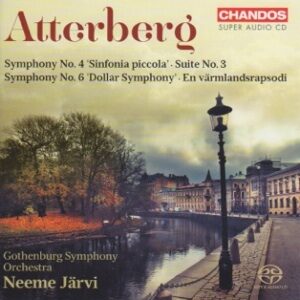Kurt Atterberg was a wonderful, genuinely romantic composer with a distinctive melodic gift and a genuine sense of humor. His “Dollar” Symphony (No. 6) won first prize in American Columbia’s “Spirit of Schubert” symphony competition of 1928, hence the nickname. The runner-up was Franz Schmidt’s deathly dull Third Symphony, so even if the judging was shot through with the usual nationalist bias and BS, it looks like they got it right somehow.
What this music has to do with Schubert is anyone’s guess—it’s just typical Atterberg, a delicious confection in three movements with an absolutely hilarious finale, complete with fake fugues and other fun-filled goodies. The work has been lucky on disc, starting with Beecham’s 1928 premiere recording. Toscanini played it too, but in modern times we have superb readings on BIS, as well as Ari Rasilainen on CPO as part of the label’s complete symphony edition. This performance is as good as the best of them: spontaneous, impulsive, and exciting, and terrifically recorded in SACD multi-channel sound.
The Fourth Symphony “Sinfonia piccola” is just that: a charming opusculum in four pithy movements lasting less than 20 minutes. Suite No. 3, for solo violin, solo viola, and strings, derives from theatrical music to one of those fuzzy symbolist plays by Maurice Maeterlinck. The music is sweet, gentle, and well, fuzzy and symbolist (although it firms up for the waltz at the end). En värmlandsrapsodi is one of those luscious bits of nature painting that Atterberg could crank out at the drop of a hat. Not that there’s anything casual about it: the piece is extremely beautiful and well-crafted. All of these remaining performances are excellent; it’s great to report that Neeme Järvi seems to be back on top form again. I wouldn’t say that this is better than Rasilainen in the symphonies, but it’s just as good, and worth collecting.
































